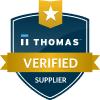Aluminum’s formability, corrosion-resistant nature, durability, and non-toxic properties make it ideal for use in many alloys. One of the many forms this element can take is aluminum sheet metal. Aluminum sheet metal is useful for fabricating products such as enclosures, assemblies, framing, chassis, panels, and countless others. Some of the many industries that use this material include:
- Medical
- Electronic enclosures
- Defense/military
- Energy
- Aerospace/avionics
- Custom projects
Aluminum Sheet Metal Fabrication Methods
At T/J Fabricators, we use several aluminum custom sheet metal fabrication methods:
- Aluminum laser cutting. We offer a selection of laser cutting services with short lead times and optimal quality using our state-of-the-art equipment. Our advanced 3-axis machines can produce high volumes of parts made from aluminum and aluminum alloys.
- Aluminum metal forming. For projects requiring custom tooling, we offer aluminum metal forming services using cutting-edge press brake forming machinery. Our equipment includes down-acting and up-acting machines that provide consistent repeatability and accuracy, with the ability to achieve tolerances as tight as +0.002″.
- Aluminum welding.T/J Fabricator’s aluminum welding services facilitate the construction of precise and complex assemblies. Our combination of experienced staff, reliable equipment, supplies, and technique enables us to complete challenging welds with consistently high accuracy.
- Other fabrication processes. We offer a full portfolio of aluminum metal fabrication processes to support an expansive range of applications. Our other fabrication services include CNC machining, punching, hardware insertion, polishing, finishing, and more.
Aluminum Grades for Sheet Metal
Aluminum is commonly used for a wide range of industrial and non-industrial applications, but it’s important to select the appropriate grade. The differences between grades make it necessary to understand the physical characteristics of each grade during material selection. Here are some of the most common aluminum grades and their properties:
Grade 1100-H14
This grade provides optimal ductility for applications involving deep draws and welding. Of note, increased ductility comes with decreased strength. This alloy is frequently used in chemical processing applications due to its high weather and chemical resistances.
Grade 3003-H14
This formable, weldable, corrosion-resistant, and cost-effective aluminum grade is considerably stronger than 1100-grade aluminum. This grade has become popular for storage cabinets and housings because of its compatibility with drawing and stamping processes.
Grade 5052-H32
This grade is stronger than both 1100- and 3003-grade aluminum, with sufficient corrosion resistance, formability, and weldability. It is often ideal for applications requiring optimal strength, such as chassis and tanks.
Grade 6061-T6
Primarily used for aircraft components, auto parts, firearms, bicycles, and yachts, and other heavy-duty applications, this very strong grade features heat-treated structural aluminum construction that offers increased toughness, but less weldability and formability than other grades.
Advantages of Aluminum Sheet Metal
Click to Expand Aluminum sheet metal provides several benefits that make it suitable for a variety of applications:
Aluminum sheet metal provides several benefits that make it suitable for a variety of applications:
- Corrosion resistance. Many metal materials are vulnerable to corrosion when they come into contact with oxygen. Aluminum generates an oxide coating that protects the material and makes it highly resistant to corrosion.
- Low material weight. Aluminum is among the lightest metal materials, weighing around one-third of stainless steel and steel. Its lightweight nature makes it compatible with weight-sensitive applications such as vehicles and aircraft, significantly reducing equipment weight without any compromise in load capacity or stability.
- Electrical and thermal conductivity. While aluminum isn’t as conductive as copper, it’s still a good conductor of electricity and heat with a lower weight. Aluminum’s good conductivity and lightweight properties make it popular for power transmission lines and heat sinks in electrical devices and other products.
- Reflectivity and ductility. Aluminum is also a good reflector of both heat and visible light, which makes it a great material for use in reflectors found in light fixtures. In addition, aluminum’s low melting point and density allow for more ductility, which means that it’s easy to bend and manipulate after melting.
- Environmental sustainability. Aluminum is entirely recyclable without experiencing any depreciation of quality during the recycling process. Re-melting aluminum requires minimal energy, consuming only around 5% of the energy needed to initially fabricate the primary metal.
Contact T/J Fabricators for Custom Aluminum Sheet Metal Fabrication
At T/J Fabricators, we can produce custom aluminum sheet metal for nearly any application. If you would like to learn more about our aluminum sheet metal fabrication capabilities, please contact us or request a quote today.




